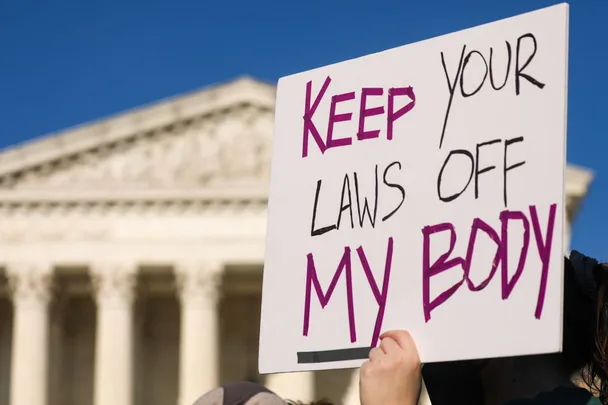Today, June 24, 2022, the Supreme Court put every American woman in a time machine—not to a future filled with flying cars, but back to a past filled with desperation and back-alley abortions. Despite our preview (in the form of a highly unusual leaked draft opinion in May) of the Court’s inclination to overturn Roe v. Wade, it is still jarring to face this new reality: that in 2022 we have fewer rights than our mothers.
Roe v. Wade was an earthquake in American politics 50 years ago. Before that landmark decision, American women spent decades using whatever resources they had to procure illegal abortions. Women with resources took flights to London or trips to Mexico. Women with little or no resources threw themselves down stairways or drank Lysol. Then, with one ruling, our mothers had a Constitutionally assured right to end an unwanted or dangerous pregnancy.
That is not to say Roe created a reproductive rights paradise. Since Roe, the Court has allowed states to regulate abortion care based on estimated gestation periods, the qualifications of doctors, the proximity of abortion providers to hospitals, parental consent for minor patients, and the “counseling” provided to patients in advance of receiving services. Roe was always an imperfect decision that left abortion care in a precarious position based on how state legislatures would attempt to restrict or expand the right it recognised.
That precariousness—and the battle that ensued—has resulted in abortion becoming one of the most galvanising issues in American politics. But most polling on abortion shows Americans didn’t want a trip in the Supreme Court’s time machine. They believe there is some Constitutional right to abortion care.
Now, a Supreme Court majority of 6 justices—3 of whom were appointed controversially by a former, twice-impeached President who lost the popular vote—has overturned Roe.The Court says it is now righting a historic wrong by returning the power to regulate abortion to state legislatures, arguing that it makes the governance of abortion more democratic. Justice Alito writes in the majority opinion: “It is time to heed the Constitution and return the issue of abortion to the people’s elected representatives.” (Ironic, considering yesterday the Court took away a state’s right to regulate guns.) The Court is not accountable to public opinion, but at a time when the country is so deeply divided, so few people overriding the will of so many seems like the very opposite of democratic.
However, democracy always offers a path forward—even when we feel thrust into the past. And just like our grandmothers, we will have to fight to change a political system that excludes and denies. Here’s what we must fight for:
1. Healthcare needs to be more available, affordable, accessible, and inclusive.
Pre-Roe history teaches us one thing: A woman will go to dangerous lengths to end an unwanted pregnancy. In an age filled with mail-order pharmaceuticals and state legislatures struggling to keep up with the latest technology, there is a danger that some women will self-prescribe and self-procure drugs related to abortion care. In order to ensure women receive safe, effective care, it is critical they have strong, trusted relationships with medical professionals. Studies also show abortion restrictions most burden women of color and women who are socio-economically disadvantaged. Transgender men who become pregnant also need access to medical professionals to ensure that they are receiving safe and effective reproductive care.
Post-Covid, we know our healthcare system is overburdened and out of reach for too many. It needs an overhaul to meet a new host of challenges that will follow the Court’s decision, especially in the thirteen states that have so-called trigger laws. In Arkansas, Idaho, Kentucky, Louisiana, Mississippi, Missouri, North Dakota, Oklahoma, South Dakota, Tennessee, Texas, Utah, and Wyoming, abortion is now or will soon be (via certification or following a 30-day period) illegal with limited or no exceptions. Navigating the exceptions requires a robust medical system, where patients connect with care early in their pregnancies and physicians are able to rapidly detect and properly certify medical need for abortion services.
2. Parents must have greater societal support.
The reality is that parenting in America is harder than it has to be. With the end to a constitutional right to abortion, more people will be forced into this reality against their will. Many American parents are walking tightropes that Covid has frayed. Parents all over the country can’t find infant formula or accessible child care or affordable housing. Some parenting hardships come with the role; others are policy choices. We have the ability to provide infrastructure to support families: to ensure that babies have formula, diapers, and skilled caregivers; to ensure that schools are safe and able to meet students’ diverse needs; to help families secure stable nutrition and housing; and to make education a ramp to a good life.
3. We cannot agree to disagree about abortion.
In some ways, Roe insulated our political conflict about abortion from its consequences. Those of us outside of reproductive healthcare and professional activism could identify as pro-choice or anti-choice without giving much consideration to the details. The Court’s decision allows state legislatures to enact extremely draconian measures, including throwing women who seek abortions in jail.Too often, state legislators are relatively unknown to the vast majority of their constituents, and their actions are shielded from public scrutiny unless they make national headlines.
In the wake of the Court’s decision, we need to engage with each other and our state elections to arrive at legislation that reflects what most people see as common sense. Now that states are going to have broad authority over the availability of abortion services (including services that are provided when a desperately-wanted pregnancy is lost), it is critically important that we educate ourselves about the issues, share what we learn with our communities, familiarize ourselves with our state legislators, and support candidates who understand the depth and complexity of abortion care.
4. We need to act with purpose, not with violence.
The American people are still reeling from Covid-19’s devastation. We have labor shortages, ongoing supply chain hardships, and rising prices. Mass shootings have shaken the country, and crime historically rises with the temperature. There are more guns than people in the United States, and domestic terrorism is on the rise. With this decision, the Supreme Court throws accelerant on an already-raging fire of polarization. Reproductive freedom is an issue of intense personal conviction and intense social power. We need to act with purpose and urgency to confront the challenges that will follow this decision. As we do so, we need to commit to non-violence.
5. We need to invest in governmental reform.
It is hard to pay attention to issues like gerrymandering or the Electoral Count Act when you’re just trying to get through each day. But there are so many efforts already under way to ensure that our government is more transparent, responsive, effective, and accountable to our people and our ideals. President Biden has asked a nonpartisan commission to consider reforms to the Supreme Court. Several states are using nonpartisan commissions to establish their legislative districts—others are considering such proposals. Proposals like the National Popular Vote Interstate Compact exist to help us ensure that presidents represent the entirety of the country. Ranked choice voting, term limits, and open primaries might improve our elections, fields of candidates, and outcomes. It is easy to practice despair and cynicism, but we have the power to make our government work for us. Let today’s decision be a call to action for us to take it.
This article was originally published on marie claire US. Read it here. Beth Silvers and Sarah Stewart Holland are the hosts of Pantsuit Politics Podcast.










